“The Day of the Doctor” Trailer
This trailer for the 50th Anniversary Doctor Who special promises great things. In one month, we’ll see if they deliver!
Month of Horrors / Hell is Adaptations: The Silence of the Lambs
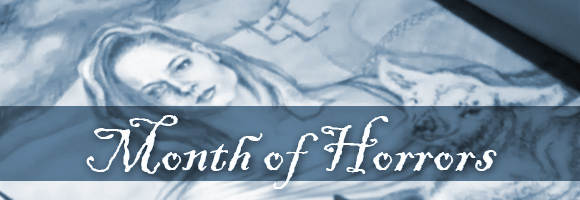
“Memory, Agent Starling, is what I have instead of a view.”
It’s easy to understand how Manhunter and its source material Red Dragon lost much of its staying power after the release of The Silence of the Lambs in 1991. This is the film that made many people ridiculously famous: Anthony Hopkins, Jodie Foster, Ted Levine, Jonathan Demme, and Thomas Harris, among others. It won five Academy Awards in one swoop, beating out The Prince of Tides (for Best Picture), JFK (Best Director), Cape Fear (Best Actor), Thelma & Louise (Best Actress), and Fried Green Tomatoes (Best Adapted Screenplay).
Unlike Harris’ novel, Silence the film is a standalone piece that makes no reference to the earlier story, ignoring the novel’s many reference’s to Red Dragon’s protagonist Will Graham, now living as a disfigured drunk somewhere in Florida, and inferring that Graham’s boss Jack Crawford was the one who caught the notorious cannibal psychiatrist Dr. Hannibal Lecter. For the purposes of adaptation to a new medium, it’s understandable that many changes would need to be made, but it’s actually fascinating how well the finished product works both as a standalone piece of art and as an adaptation.
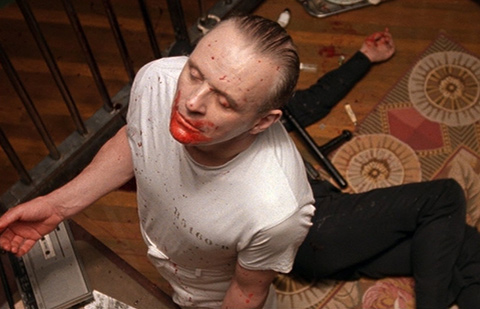
“I ate your script with a Montrachet and a side of red caviar.”
Book Gift Suggestions: Horror
![]()
It’s been a while since we created our suggestion list for Fantasy, and the Month of Horrors seemed like the perfect time to cobble together a list for Horror. Been looking for some good genre book recommendations you can pass along to non-genre or genre-beginner readers? Here are some works of fiction that will blow their minds and make them addicts just like you.
Today’s list contains half a dozen Horror books to knock the socks off the people who don’t have good genre taste… yet.
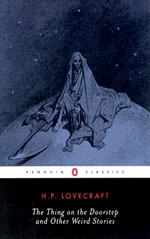 The Thing on the Doorstep and Other Weird Stories, by H. P. Lovecraft
The Thing on the Doorstep and Other Weird Stories, by H. P. Lovecraft
Arguably, you could hand a reader any collection of Lovecraft stories, and the effect would be just about the same. The master of weird fiction rotated regularly through just a few variations on his theme of supernatural terror: from intrusions out of the dream world to beautiful symbolic visions, from unnatural resurrections to polar-dwelling Elder Things, you can be sure that at least somebody will be losing his sanity, if not his lunch. Many of the stories in this volume also tie in to Lovecraft’s popular Cthulhu Mythos, so there’s plenty of temptation here to find more to read.
Perfect For: People who like old-timey scares and wish their steampunk novels had more unnatural geometry.
 20th Century Ghosts, by Joe Hill
20th Century Ghosts, by Joe Hill
One might shy away from Hill’s collection of short stories in favor of his more popular novels, but 20th Century Ghosts has something for everybody to enjoy. As I wrote in my longer review last year, the stories that especially stand out are “20th Century Ghost” (about a dead girl who loves the movies too much to leave the theatre), “The Black Phone” (a terrifying tale of kidnapping and phone calls from the dead), “The Cape” (a spooky story of a… different kind of superhero), and “Voluntary Committal” (wherein one might easily be lost amidst the cardboard maze in the basement). Don’t miss out on Hill’s sequel to Dracula and his personal take on Kafka’s Metamorphosis, either.
Perfect For: Anyone who likes disturbingly surreal tales.
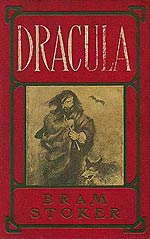 Dracula, by Bram Stoker
Dracula, by Bram Stoker
By far the most obvious recommendation on this list, you might be surprised how many people have never read the novel that sparked the popularity of the “romantic vampire” subgenre. Told entirely as an epistolary novel, Dracula follows the ever-shifting fortunes of a small group of English aristocrats as an ancient Transylvanian vampire decides to hitch a ride to their homeland from the old country. It’s both a look at the fragility of Victorian mores, and awe at the power of the mysterious foreign “other.” Arguably also a yearning for a spiritually-enriched world that the Enlightenment cast aside, Stoker’s novel offers a great deal even for a jaded, modern audience.
Perfect For: That friend who’s watched every Dracula movie.
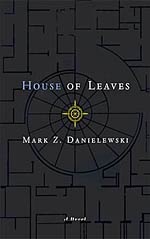 House of Leaves, by Mark Z. Danielewski
House of Leaves, by Mark Z. Danielewski
Danielewski isn’t well known for his fiction outside of this novel, partly because he hasn’t written much else, but mostly because his other work is so rarified and abstract that it only appeals to a niche audience. However, House of Leaves was his first and most popular work, despite some aspects that a popular audience might find pretentious. This is a story told from the perspective of a young tattoo artist Johnny Truant, writing about a found manuscript detailing a documentary that does not seem to officially exist, The Navidson Record. It’s a narrative within a narrative within a narrative, copiously (and often erroneously) footnoted. The documentary concerns a preternaturally-shaped house, which may or may not be haunted, and which frequently changes its inner layout and dimensions. It’s hard to be both scary and erudite, but Danielewski manages.
Perfect For: Someone who’s ready to make the leap into metafiction.
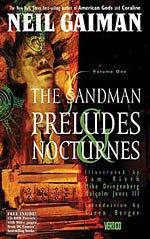 The Sandman: Preludes and Nocturnes, by Neil Gaiman
The Sandman: Preludes and Nocturnes, by Neil Gaiman
Although Neil Gaiman has long had a reputation as a Horror writer, much of his fiction is simply Fantasy with a slight twist of Horror. Even most of his run on the Sandman comic series was more about Fantasy than Horror. But the first volume of this popular set definitely shows off Gaiman’s talent at writing Horror, albeit the sort influenced more by old Horror comics than novels. As he introduces the character of Morpheus, the King of Dreams, he is at great pains to remind us that Morpheus is also the King of Nightmares. The series found a larger audience after this first storyline, but I will always have a soft spot for this mash-up of Gothic and old-school comic book scares.
Perfect For: Wannabe goths and people wondering how Neil Gaiman got his start.
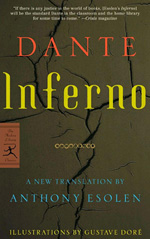 Inferno, by Dante Alighieri
Inferno, by Dante Alighieri
Ok, this one might be pushing it a little. There’s no doubt that much of today’s Horror fiction simply could not exist without Dante, but his medieval epic poem does not easily fit into the genre as we know it today. It also does not provide the thrills-n-chills normally associated with Horror. It is rather a more intellectual look at the horrors of the human spirit, and a sober acknowledgement of where they lead us. That being said, I would stack up the story told by Count Ugolino in the ninth circle of Hell about his betrayal by an archbishop to a slow and very cruel death against anything written by Stephen King or Clive Barker. You can also learn how Hell actually froze over a very, very long time ago.
Perfect For: Poetry lovers and those curious about ancient cosmologies.
Have anything you’d like to add to the list? Let us know in the comments!
Guest Post by Ann Leckie: Personhood and Song
Ann Leckie has worked as a waitress, a receptionist, a rodman on a land-surveying crew, a lunch lady, and a recording engineer. The author of many published short stories, and secretary of the Science Fiction Writers of America, she lives in St. Louis, Missouri, with her husband, children, and cats.
 What does it mean to be human? It’s a really difficult question to answer, and one that science fiction and fantasy are particularly well-suited to tackling. Not that there’s ever been any sort of simple answer even (especially?) through fiction, but SF&F can present us with a range of characters that test the boundaries of what it means to be a person, and what that might imply about what it means to be human.
What does it mean to be human? It’s a really difficult question to answer, and one that science fiction and fantasy are particularly well-suited to tackling. Not that there’s ever been any sort of simple answer even (especially?) through fiction, but SF&F can present us with a range of characters that test the boundaries of what it means to be a person, and what that might imply about what it means to be human.
Androids and artificial intelligences are a favorite vehicle for this sort of exploration. If you build a machine that looks or acts just like a person, what’s the difference? Is there one? Is that difference important? Why? It was a question I was going to have to consider, a question that was, in some ways, going to be crucial to my novel, Ancillary Justice.
The narrator of Ancillary Justice is the troop carrier Justice of Toren. And also a unit of twenty bodies slaved to Justice of Toren, the ancillary unit Justice of Toren One Esk. My narrator is an artificial intelligence that’s also made up of human bodies. What sort of being is this?
Month of Horrors / Hell is Adaptations: Manhunter
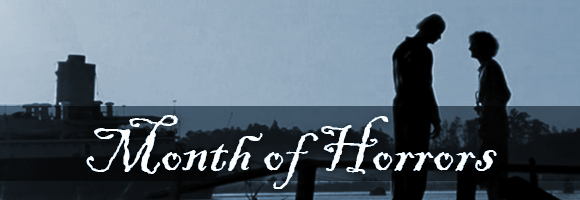
Watching Michael Mann’s Manhunter is something like watching a now-famous actor in a commercial filmed at the beginning of his career; except that here the actor is a character, and the character is Dr. Hannibal Lecter. Yes, this year’s Month of Horrors will feature a crossover with our Hell is Adaptations series in an overview of all the films adapting the Hannibal Lecter novels.
What is especially noticeable to fans of later Lecter films is the scarcity of the popular cannibal in this 1986 crime thriller. It seems a little silly to assume that anybody would need an introduction to the character of “Hannibal the Cannibal,” but perhaps a quick overview is in order for the few newcomers. Originally created for Thomas Harris’ 1981 crime novel Red Dragon, Dr. Hannibal Lecter is an extremely intelligent serial killer from Eastern Europe who ate his victims and avoided detection and arrest for many years before being caught almost by chance by FBI agent William Graham, a man who has the ability to empathize with killers and figure them out from the inside. Dr. Lecter worked both in an emergency room and later as a psychiatrist, and used his medical knowledge to commit and hide his violent crimes. In many of the media adaptations of the Lecter novels, the cannibal doctor often serves as a guide to help the FBI apprehend other serial killers, though usually with the intention of playing both sides of the game.
Banned Books Updates
 As much as we had hoped to write up a full feature for Banned Books Week, life and responsibilities got in the way. Fortunately, we were able to roll out some updates for our Banned Books List. Specifically, we have begun adding the reasons a specific book has been banned on the novel page. For instance, did you know that Fahrenheit 451 was partially censored by the publisher without Ray Bradbury’s knowledge, with the expurgated version being sold to high schools and the original sold to mainstream bookstores? Or that the “happy ending” of A Clockwork Orange was removed from the American edition because the publisher thought it was unrealistic?
As much as we had hoped to write up a full feature for Banned Books Week, life and responsibilities got in the way. Fortunately, we were able to roll out some updates for our Banned Books List. Specifically, we have begun adding the reasons a specific book has been banned on the novel page. For instance, did you know that Fahrenheit 451 was partially censored by the publisher without Ray Bradbury’s knowledge, with the expurgated version being sold to high schools and the original sold to mainstream bookstores? Or that the “happy ending” of A Clockwork Orange was removed from the American edition because the publisher thought it was unrealistic?
You can read about these cases and more on the individual novel pages in the Synopsis section. Not every book on our list has a note about that novel’s censorship or banning, but we’re working on building that content. Which is where you, gentle reader, come in…
Many of the books on our list were gleaned from other lists that provided no specific information about the ban or censorship. Some lists, like the ALA’s, provide partial information on some books. We would like to make this list as accurate and thorough as possible, which means we need to (1) provide at least a summary reason for every book’s banning or censorship, (2) remove any books which do not really belong on this list (this might include books that were only challenged but never banned), and (3) add any genre books that are missing from our list.
We could certainly use help researching these books! Too much information about banned books comes via hearsay or unsourced Wikipedia articles, so solid information is a huge help. If you have any information that can make our Banned Books List more accurate, please share it in the comments below or hit us on Twitter.
Thanks, and expect more in the days to come!
Elysium Review
Straddling a tense line between entertainment and bland moralizing, District 9 director Neill Blomkamp has taken a huge step backwards with his newest film Elysium. I had high hopes for this one, believe me. The trailers looked visually original with an interesting if unambitious setup. Blomkamp’s first film about alien visitors failing to find a home on Earth was surprisingly original, fun, and even rather intelligent. Blomkamp’s second film about the so-called 99%’s ressentiment against the very rich is an even more cartoonish take on the subject than The Dark Knight Rises.
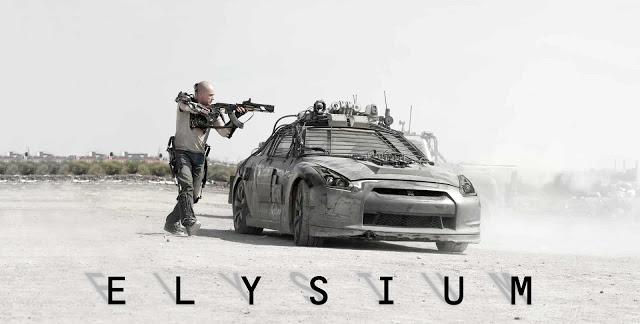
“Damn it, Damon, stop shooting the car!”
The setup for this story is sort of a hodge-podge of earlier futuristic dystopias. Our planet in 2154 is overpopulated (never mind the very real impending population implosion), and the very rich have absconded to a paradisaical satellite named Elysium (complete with artificial gravity, never mind that the damn circular thing doesn’t spin), which apparently acts as its own sovereign nation (whose ruling cabinet can be deposed with a simple computer reboot, to hell with democracy), and which also jealously defends its territory against aggressive immigrants (never mind that an on-board missile defense system would make more sense than hiring one “rouge” agent with a really good gun to shoot them down from Earth), who slip in by simply flying into the open atmosphere of the satellite (apparently the rich are too cheap to build a roof, and who’s worried about cosmic rays?), and who only want to use Elysium’s magical healing machines for their ailments (all machines conveniently placed in the living or dining room of every Elysian home!). The sci-fi trappings of the film are so utterly absurd and poorly considered that I couldn’t stop laughing at the screen.
Not only that, but Blomkamp apparently has no sense of time and space. At one point a group of hunters is flying a hovercraft around L.A. airspace on the hunt for Max Da Costa (Matt Damon), and have sent out half a dozen video-equipped drones throughout the city to help locate him. His face shows up on one of their drone monitors, and the leader tells them to turn the craft around to get him. No less than five seconds later they fly up to Max, him still holding the drone in his hands. Unless the hovercraft had a teleportation device we didn’t know about, it should have taken them much longer to arrive at their destination. Little problems like this, and worse, show up repeatedly in the film. One that really bugged me was that Elysium always seems to be easily visible from the Earth’s surface at all times, regardless of a person’s location, the local pollution level, or the distance between Elysium and Earth.
The dialogue spitting out of the characters’ mouths is just as inane as the rest of the film’s problems would suggest. There’s a lot of unearned sentimentalism surrounding Max and his childhood love Frey (Alice Braga). Jodie Foster plays Jessica Delacourt, a government minister in charge of the sort of military operations which make Elysium’s president queasy, but she speaks only cliched dialogue which tells us nothing of her inner life, and she plays it with an odd accent that seems entirely unlike the accents of her fellow aristocrats. Even America’s favorite bad guy actor William Fichtner has lines that could have been written by a teenager (“I need to be busy not talking to you now”). Matt Damon is playing his usual Bland Action Man role, so there’s not much going on there. The only actor who’s even not boring is Sharlto Copley, who played the “racist with a heart of gold” Wikus in District 9, and who here plays a South American mercenary named Kruger. I never thought I’d watch a big-budget science fiction film that had worse writing than Avatar.
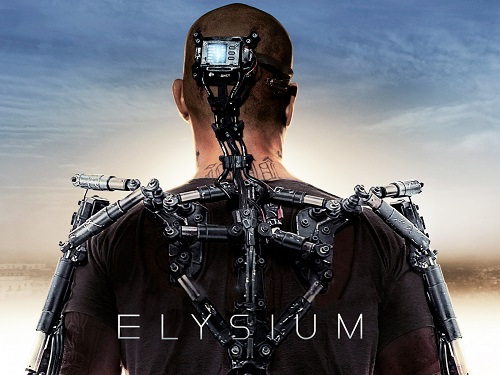
Acting ability extraction… complete.
[IMPENDING SPOILERS, if you still care.] Unsurprisingly, the film rumbles full speed into the train wreck of its inevitable ending where the magical healthcare machines on Elysium are distributed to all the poor and ailing people of Earth. Sure, I realize that Elysium has more of these machines than it knows what to do with (remember the part about a machine sitting in every living room), but I don’t think that very many of the sick people of Earth will be able to be healed before the machines start breaking down, and then who can still afford to fix them? I get that Blomkamp was going for a sort of anti-Atlas Shrugged story here, but his ideas are even sillier and less realistic than Ayn Rand’s.
The director recently stated in an interview that “I just want to be an artist that’s just left alone.” Well, if he doesn’t clean up his act quickly, Hollywood might leave him alone indefinitely. Elysium had almost four times the budget of District 9, and only a small fraction of the imagination. This is less a sophomore slump than a sophomore suicide attempt. His third film Chappie is set to release next year, so I guess we’ll see if he can recuperate. I’m not holding my breath.
Breaking Bad Meets Star Trek
If there was any doubt that Breaking Bad has lots to do with science fiction, let that doubt be crushed.



















 Full Details
Full Details

